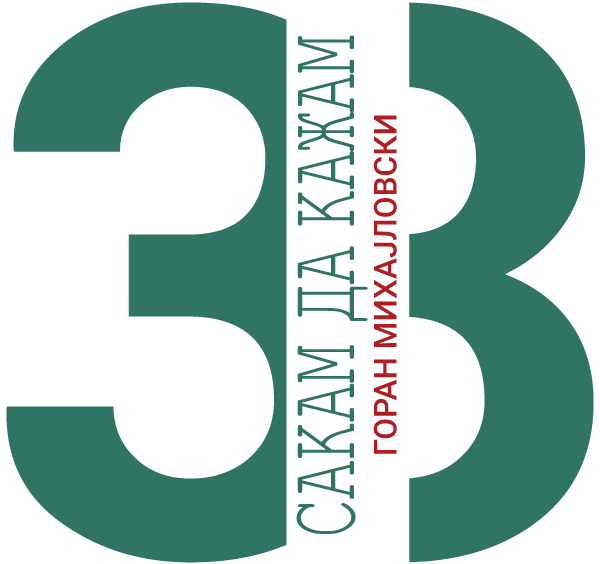1 The main celebration of 11 October, the Day of the Macedonian Uprising against fascism is marked in a unique way. For several years, delegations haven’t been laying flowers in front of the “Macedonian Woman” monument at the Memorial Ossuary in Kumanovo, where the bones of over 300 fighters lie, but behind the monument instead. Presidents, prime ministers, ministers come here every year to pay their respects to the soldiers who died in the anti-fascist war fighting to liberate Macedonia, and yet they don’t see that the entire memorial complex is falling apart. So, the authorities thought of a way to hide the fact that part of the copper relief has been stolen, that a plaque with the names of the fallen soldiers is missing, and that the paths, the grass and flower patches leading to the monument have been destroyed. That’s why, although it’s illogical and it’s something the Union of Fighters complained about, delegations come from behind, and the whole show, along with the dry speeches and the music, takes place behind the back of the “Macedonian Woman.” At the back, the pavement is in a somewhat better condition, and once you throw a red carpet on top of it, it’s enough to cover the shame.
Minister of Culture Bisera Kostadinovska-Stojchevska announced that the Ministry has been working on a 2023 project as “a kind of national strategy to restore, refurbish and to fully repair the monuments of The Anti-Fascist and National Liberation War.”
Dear God, why would there be a strategy for maintaining monuments? Why don’t municipalities simply take care of the monuments on their territory? Doesn’t the mayor of Kumanovo, Maksim Dimitrievski, see the state of the monument and its surroundings? Do we really need a national strategy for mowing the lawn, tiling, planting flowers and security services? Aren’t Prilep and Kumanovo in competition with each other over where the first shot went off? It seems it was in Prilep, since, there, the Mound of the Undefeated is well-maintained. The mayor of Skopje, Danela Arsovska, can just look out of her office window and she’ll see two pedestals collapsed in the City Park, the same pedestals from which the busts of Nikola Vapcarov and Kole Nedelkovski had been stolen. She, too, is waiting for Bisera’s strategy.
The house in the village of Podvis, in Kichevo, where in the first liberated territory the partisans organized lessons in Macedonian for the children from the “Kopachka” area, is also falling apart. This happened on 23 September, 1943, almost a whole year before the Anti-fascist Assembly for the National Liberation of Macedonia. All that remains is the memorial plaque, which has been pierced by a hunter’s bullet, stored away in someone’s cellar. The house was registered as a cultural heritage in 1978.
I don’t know another country which is so negligent in taking care of its monuments. What’s even worse is that the central and local authorities have carelessly let the monuments to the anti-fascist struggle fall apart, the monuments which are not just rare architectural and artistic works, but also monuments to the essence of Macedonia’s statehood won by the anti-fascist fighters.
Until the strategy and coordination of four institutions is ready in 2023, the Freedom Monument in Kochani, which commemorates the historical struggles of the Macedonian people from the Ilinden Uprising to the National Liberation War, will be restored with a grant of 254,000 dollars through the U.S. Ambassadors Fund. After they renovated our ancient and medieval monuments with the Ambassador’s Fund, Americans have now decided to renovate our Second World War monuments, too. They seem to be more aware of how significant anti-fascism is for our county than all of our authorities put together. Especially at this moment.
2 In these strange times brought about by the Bulgarian European veto, while we’re on our way to the EU with a twinkle in our eye, every holiday from now on, we’ll fear which song will be sung, whether they’ll sing all the verses and what’s the correct version. And it will last at least until 2030, when, as the prime minister says, we’ll welcome the bright European perspective. Then, we won’t even have to sing, because our life will be a song anyway.
3 The vision for the European Union is losing its lustre and nationalism has reappeared in its place, said former Greek Prime Minister George Papandreou, whose report on EU’s perspectives in the Western Balkans was adopted by the Parliamentary Assembly of the Council of Europe in Strasbourg. The report states that “an increasing number of people, especially young people, think the European perspective will never materialize”.
His fellow citizen, former Minister of Foreign Affairs Dora Bakoyannis, was even more direct. “Time is running out for the Western Balkans. EU must act immediately”, said Bakoyannis and received applause in the Council of Europe.
It would have been honourable if Papandreou and Bakoyannis had spoken about their responsibility for why the Balkans have been kept in a bunker for 30 years. They themselves, as politicians, are to blame for killing Macedonia’s hope in the European perspective for 30 years with the nonsensical name dispute. They opened the European door for Bulgaria to start an even more nonsensical dispute about our language and our national identity.
And now, Papandreou is complaining that “European prospects are weakening, it is increasingly more apparent that there is a new geopoliticization of the region with third parties, which are fighting for influence and deepening the existing chasms”.
Well, Greece is the one who opened that chasm. Bulgaria is just deepening it now.
And they’re still saying: The EU must act immediately. And the EU acts in such a way that it asks you to change your Constitution a second time, to accept that a neighbouring country can tell you what to call yourself, what language you speak and whether your exist or not. Since, you’re outside and they’re inside.
Translated by Nikola Gjelincheski
